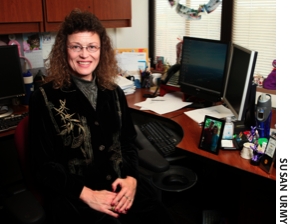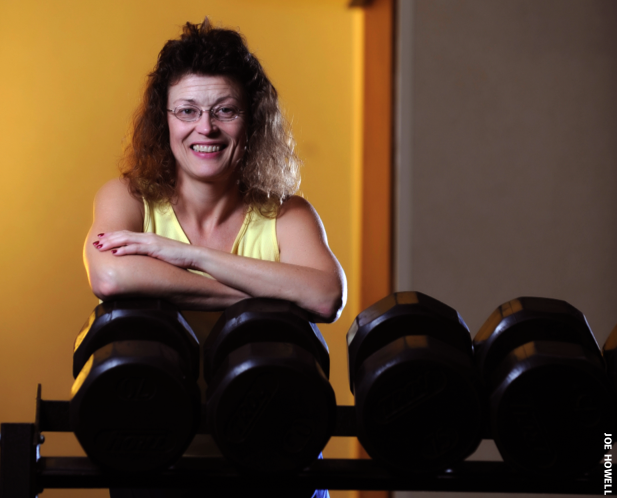42 pounds, off for 21 years. And counting
by Nancy Humphrey
Believe it or not, Paula McGown’s biggest health accomplishment isn’t that she lost 42 pounds in 1990. It’s that she’s kept it off for 21 years.
“I’ve had a 1- to 2-pound variance, from time to time, but that’s it,” she says, sitting in her office at Vanderbilt University Medical Center’s Occupational Health, a bunch of bananas hanging from a hook over her left shoulder.
McGown’s motivation to lose the weight, more than two decades ago, came from within. She, like most of her family members, had been overweight all her life. One of her sisters has diabetes. Another died of a heart attack when she was 40. It was time for a change, McGown said. “I never sat down and calculated it, but I bet I was eating thousands and thousands of calories. I was eating whole bags of potato chips,” she said.
“Everybody has something that will tip them over. I was young and was just tired of being overweight, of not getting the boyfriends, of not being able to wear the cute clothes. For some people it’s wanting to see their kids graduate from high school or wanting to live to see their grandchildren. It has to be something you want. You can’t change because someone else wants you to change.”
McGown was overweight when she came to Vanderbilt for her undergraduate degree. She didn’t gain the “freshman fifteen” during her first year, and actually lost a little weight. “But I more than made up for that over the next three years,” she said.
After graduating from Vanderbilt with a Bachelor of Nursing degree, then getting a master’s degree in Nursing from Vanderbilt University School of Nursing, she was on her own, working full-time on Vanderbilt’s orthopaedic unit in 1989. “Everything hurt. My back hurt. I needed to get the weight off. Crash diets had never worked. I’d lose a little, then gradually gain it back and maybe a little more.”
Changes
And that’s when she decided to change her life. She chose a fairly new weight loss plan that offered pre-packaged portion-controlled food and lost 42 pounds in 21 weeks. She attended weekly meetings and bought all of her food from the weight loss company except for milk products, fruits and vegetables. The petite 5-foot-4 inch woman dropped from 180 pounds to her goal weight of 138. After that, she did a maintenance plan for six months (eating part pre-packaged foods and part regular food), and attended meetings first every other week, then eventually once a month. During this time she lost another 10 pounds.
The only thing missing from her weight loss plan was regular exercise. During a temporary move to a small town in Kentucky, she walked a half hour to an hour a day, because it was a small town and it was easy to get around by walking. “But walking was basically it for about six years,” she said.
After that, she moved back to her hometown in Humphreys County to work as a nurse practitioner, then came to work at Vanderbilt in 1993, first as a nurse practitioner in Occupational Health, then in Faculty/Staff Health and Wellness where she works now as administrative officer.
In the mid 1990s, she bought a pair of hand-held weights and began using them at home. She still uses them 10-15 minutes a night while she’s watching TV. A co-worker who ran marathons encouraged McGown to try and gave her a book, “The Non-Runners Marathon Trainer.”
“I thought at the time, ‘Well, OK, Nashville has the Country Music Marathon. I could do that.’ I was in good health, normal weight,” she said. So in 2001 she followed the book’s training schedule which incrementally increases the number of miles you run as you build up endurance. The first week, she ran five minutes and walked five minutes for 30 minutes. Then, she progressed to running 10, walking five, until she could run solidly for a half hour. “It didn’t matter how far you went in a half hour,” she said. “Then it gave you a 16-week program where you ran four days a week.”
“Every week was something I had never done before. The first time I ran 3 miles, I had never run 3; then pretty soon it was 18 miles. Because I had never done any of those things, every week was a challenge.”
She completed her first Country Music Marathon in 2002 in under 6 hours. “I got to about the 20th mile, and didn’t feel that great, but I finished,” she said. “Staying on your feet for 26 miles is tough. You’re hurting the next day.”
The next year, she did it again. This time the training was “horrible,” because she’d already been through it, but the race was better. This time, at mile 20, she was feeling great, she said.
With the exception of a full marathon in 2009 in Memphis, she decided she prefers half marathons and now does four a year.
Yep, hang gliding
Five years ago, when she turned 40, she took up hang gliding. “You either launch off a mountain at 1,394 feet or get pulled up behind an ultralight plane and they release you at 2,000 feet and you glide down. If conditions are right, you can stay aloft for hours. You feel like you’re flying,” she said. “It involves a lot of physical exertion. You can’t be in bad shape. You have to carry the glider around on your own shoulders and you have to be able to run, downhill, to learn to launch it. You use a totally different set of muscles. I discovered when I started that I didn’t have much in the way of upper body strength.”
Even though she broke her arm early on while hang gliding, requiring a plate and eight screws and months of rehabilitation, it didn’t dampen her enthusiasm. She still does it three out of four weekends a month. “That only derailed me a little bit,” she said.
In addition to hang gliding and half marathons, she works out with weights at Health Plus on Mondays and Thursdays, and runs for at least a half hour every day, usually out the door before 5 a.m. She hasn’t missed a day of running in almost 1,000 days. “Can you tell I’m a little obsessive about it?” she laughs.
- Paula McGown’s routine involves lifting weights at Health Plus twice a week. And running. And hang gliding.
“I used to take one day a week and not run, but for some reason, a few summers ago, I got past the Fourth of July and thought ‘I wonder how long I can do this?’ I got to 100 days and kind of kept going, even the day after a marathon. I don’t know how long I can keep this up,” adding that she won’t run in a thunderstorm, but will run in rain, drizzle or snow. She even bought a pair of Yaktrax (like snow chains for your shoes) to give her more traction in the snow.
McGown said she thinks if she stopped exercising she might gain back some of her weight, but the main benefit of exercising is how well she feels afterward. She is still very careful about her diet, eating sensibly and in moderation. “If I want a bite of cake, I may as well take a bite or two, get it over with and go on with life. If I don’t, then it builds up and I want a whole slice of cake.”
She limits sweets in her diet, and will not drink regular soft drinks or drinks high in calories. She also chooses whole fruit over fruit juice. “I would rather have a glass of water and a piece of fruit. You feel full longer and get more fiber that way.”
“It sounds so cliché, but it’s so true—you just need to eat less and exercise more,” she said. “It just isn’t quite that easy.”


March 4th, 2011
Great article! Paula is such an inspiration to so many! Keep going Paula!
March 4th, 2011
Great article <3
March 8th, 2011
you are my hero!!! nnkathy